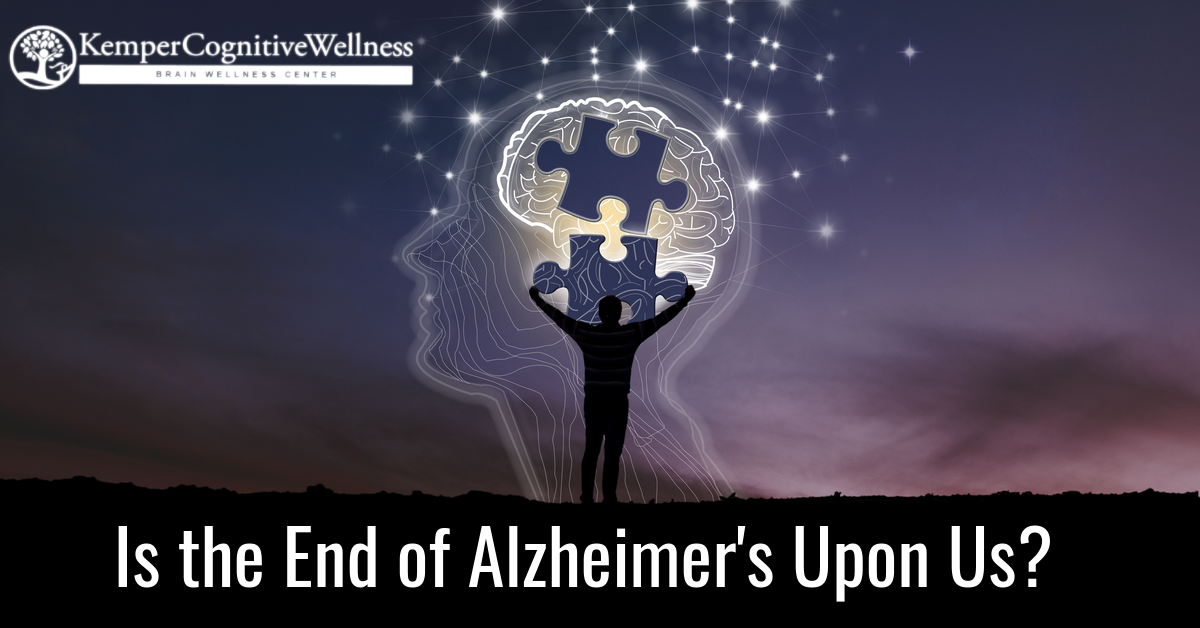November is National Alzheimer’s Disease Awareness Month. It has been a big year for the Alzheimer’s community. In June, after a nearly 20-year drought in new drug therapies for Alzheimer’s, the FDA approved Aduhelm by drug maker Biogen, to slow down the progression of the disease in cases of very early intervention. Unfortunately, the data for this new drug is scant, and the price tag is hefty.
December 2019 was a big time for Alzheimer’s prevention and treatment, too, when Richard Isaacson published Individualized clinical management of patients at risk for Alzheimer’s dementia, demonstrating multi-domain intervention for Alzheimer’s disease (AD) risk reduction as an emerging approach to prevention and treatment.
June of 2016 was important in the world of Alzheimer’s treatment also. If you’ve been following us for a while, you are aware of our appreciation for Dr. Dale Bredesen’s work, outlined in the publication Reversal of cognitive decline in Alzheimer’s disease. This groundbreaking research has fundamentally changed the way we understand and treat cognitive decline. The therapeutic approach used was programmatic and personalized rather than “monotherapeutic and invariant.” Patients who had to discontinue work were able to return to work, and those struggling at work were able to improve their performance.
People got better. Yes. In the 21st century, it is possible to have a neurodegenerative disease like Alzheimer’s, dementia, Parkinson’s, Lewy Body, and get better. Aduhelm and Aricept will slow your decline, and perhaps ease symptoms. The former comes with at a cost of over $50,000 annually, and both come with a long list of side effects and limited data on efficacy. Perhaps the other, non-pharmacologic progress noted was less newsworthy because it was not associated with a stock symbol.
Dr. Nate Bergman is applying a comprehensive diagnostic and multi-modal treatment model at Kemper Cognitive Wellness. I’m proud to say that Dr. Bergman, together with our dynamic team, is helping individuals and families across the United States – and now, internationally – understand the unique factors contributing to their cognitive loss. He’s also equipping them to push back with a personalized plan for intervention and a multidisciplinary support team. And the results are real. Our clients are pushing back and living well with dementia.
Why is ‘unique’ and ‘personalized’ important? Because we are each unique in terms of our genetics, lifestyle, and lifetime story. We now know there isn’t one factor that causes Alzheimer’s and dementia. In fact, Dr. Bredesen identified up to 36 factors driving cognitive loss. That’s why Kemper Cognitive Wellness takes a comprehensive, individualized approach in assessing every client that comes in for a Discovery Assessment of Cognitive Health. This isn’t one-size-fits-all medicine. We are interested in YOU, your story, and helping you write a new ending.
In 2021, Alzheimer’s, dementia, and other neurodegenerative diseases are treatable and preventable. And – it is possible to live well with dementia. The first step is to acknowledge changes to memory and thinking, and seek help. Adults in their 40s and 50s are increasingly being diagnosed with these diseases. (!!) If you have a genetic risk to cognitive loss, or are just not feeling as sharp as before, talk to your doctor. If your doctor dismisses your concerns, find another doctor. Dr. Bergman sees clients in Rocky River, and Ohio residents can establish care in a virtual telehealth appointment.
Call today to schedule your Discovery Assessment of Cognitive Health. It’s time to take your brain health seriously. It’s time to prevent and push back against Alzheimer’s. Call now to schedule your evaluation and we’ll set you up with a plan of action designed specifically with YOU in mind. Contact us at 855/337-1400 today.
By Jenny Kemper, Director, Kemper Cognitive Wellness





